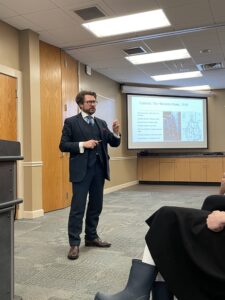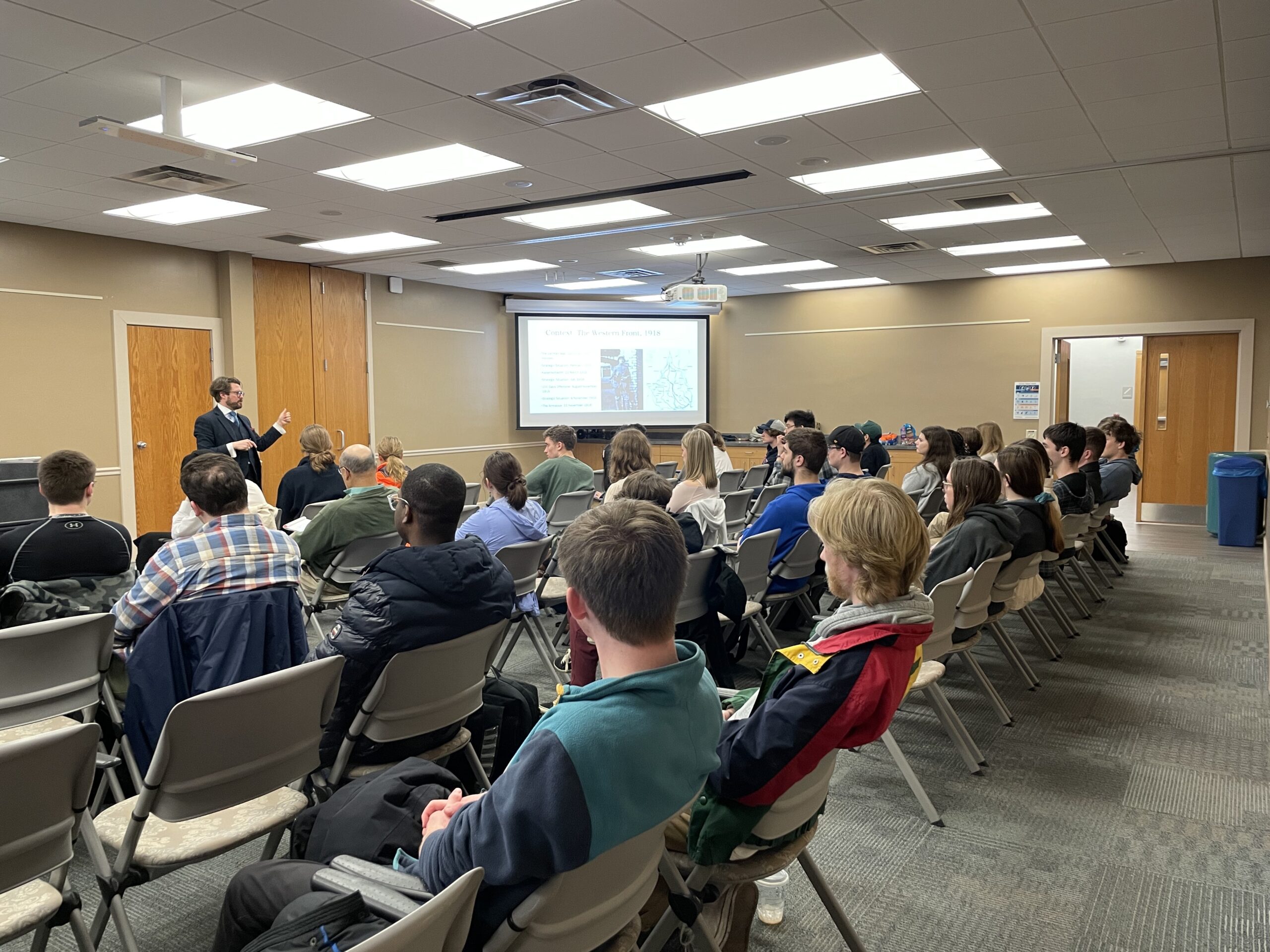By Katie Lauriello, Lead Copy Editor

History and Interdisciplinary Studies Professor Ian Isherwood presenting his lecture: “Causes Lost and Found: The Defeat of Imperial Germany and the Memory of the First World War.”(Photo Courtesy of German Studies Chairperson Kerry Wallach)
On Feb. 28, the German Studies department hosted History and Interdisciplinary Studies Professor Ian Isherwood to give a lecture for their Colloquium in the College Union Building. The lecture was titled “Causes Lost and Found: The Defeat of Imperial Germany and the Memory of the First World War.”
This lecture is part of the German Studies Colloquium series that has existed for over a decade. As one of a two-part lecture series that takes place over the course of the year, the German Studies department tries its best to bring in one lecturer from Gettysburg and one from outside the college, both outside the German department in a way to foster an interdisciplinary approach.
Before the lecture began, German Studies Chairperson Kerry Wallach introduced Isherwood to the group.
Isherwood first began the talk about common sentiments and myths surrounding Germany’s defeat in World War I. According to Isherwood, many Germans believed that rather than being defeated in the military, they were instead betrayed.
The phrase “stabbed in the back,” Isherwood explains, became a popular phrase for this sentiment after the Head Strategist General Erich Ludendorff was asked about why they lost by British General Sir Neil Malcolm over a dinner.
Then, Isherwood explained the concept of conflict and war termination.
“When do states get to a point where they decide to call it quits? How do you know if you’ve achieved victory and defeat?” said Isherwood. “War termination is an assessment that a nation makes at a particular moment in time. That means that war termination is ultimately a political decision.”
Isherwood also noted, “Victory and defeat are a matter of perspective. You can tactically win every single battle in a war, in a particular conflict, but you can ultimately lose that conflict.”
Then, Isherwood went into the context of the war from a German perspective, beginning with the idea that they were strategically outmatched from the beginning because they fought a war on two fronts. The British Navy was also able to blockade Germany, Isherwood noted, thus preventing them from accessing resources. After three years of war and little idea of how to fight a two-front war, the limited resources of the blockade hurt the German population more than before. While Germany fought back during the Kaiserschlacht and their spring offensives, their resources bled dry as they were defeated in 1918.
“What we see by the month of November 1918 is a German army that’s being pushed back on all fronts closer to Germany, a German army that’s bleeding manpower, but also manpower that’s given up its will to continue fighting,” said Isherwood.
After he finished giving context for the war, he then outlined the reasons Germany was defeated. According to Isherwood, the Allies displayed effective diplomacy, created a strong international narrative, combined naval and military strategy and possessed a large quantity of resources. In contrast, the Central Powers displayed strategic ineptitude, made poor allies, suffered several military defeats, felt the effects of attrition and failed to harness instruments of national power in the same way as the allies.
Isherwood explained, “For a country that prided itself on its military might, defeat calls into question that notion of national identity. If we’re not the most powerful militarized state in Europe, then are we? Almost immediately, military leaders begin to make excuses about what that defeat looks like.”
After World War I, Isherwood explains that Germany fell into a state of political and economic volatility that included significant amounts of paramilitary violence. Their old government was also torn down in a revolution in 1918 and replaced with the Weimar Republic. This instability increased further and further the more the myth of being “stabbed in the back” spread by Ludendorff until it eventually became accepted as fact.

This lecture was part of the German Studies Colloquium series. (Photo Courtesy of German Studies Chairperson Kerry Wallach)
Once he was finished discussing the war, Isherwood then called into importance German memory of the war after the 1930s, where World War I is still being “remembered, misremembered, or forgotten” in Germany.
Part of the reason for this conflicting memory comes from the Treaty of Versailles establishing the principle of war guilt and reparations. The second reason comes from what Isherwood called “the refraction question.” Because of the principles of refraction, Germany often sees the First World War not as a solitary entity but instead through the lens of World War II and the Holocaust. The final principle involves seeing the conflict as a European Civil War, in seeing how soldiers were more alike than different and other examples of transnational history.
Then, Isherwood took care to give more comparative considerations, noting the similarities between narratives particularly after the events of Jan. 6, 2020. This includes aspects of defeat, humiliation and victimization as well as mass trauma. After these sorts of events, defeated states have a pattern of creating myths and narratives of vindication as well as suffering under political and economic volatility.
After Isherwood finished his talk, he opened the lecture for questions. One student asked how long it took for Germany to feel the effects of the blockade. Isherwood answered that they started to feel the effects of it immediately, but their food resources started to become affected within the first two years.
Another student asked if there was a way to break the trend of finding ways to justify defeats that encourage further violence. Isherwood clarifies that, as a citizen and not as a historian, he would encourage people to teach and learn history to discern the difference between myth and a historical event as well as history and memory.
One student asked if Isherwood considered the “stabbed in the back” myth to be the imperial German version of the “Lost Cause.” Isherwood said that he believes the two are similar but different.
“They are both born out of the same sense, and they are both created by politicians and generals. The first people who are writing about the ‘stabbed in the back’ myth and the ‘Lost Cause’ of the Confederacy are people who are justifying their involvement in a literary defeat,” said Isherwood.
Another student asked if the terms of peace at the end of World War I had any direct impact on the hyperinflation in Weimar. Isherwood answered that he did not believe the signers of the Treaty of Versailles were thinking far enough ahead to see the hyperinflation coming, but the ones advising certainly did.
One student explained that they were told in a class in Germany that “World War I was the origin catastrophe of the 21st century and the Kaiser Reich.” He then asked Isherwood where he would put the First World War in between the 19th and 20th centuries.
“One of the appeals of studying conflict for me is that it begins looking like a 19th-century war and it ends looking like something amazingly modern but also something amazingly purgatorial at the same time,” said Isherwood. “The war is consequential in a way that many other conflicts have not been.”
One professor asked how the German military and government planted the seeds of the “stabbed in the back” theory and other ways they anticipated needing to find a scapegoat to explain their loss. Isherwood answered that after a 1916 census, Eric Ludendorff went into exile, knowing that Germany would probably lose, and then looked for people to blame. While in exile, various German officials encouraged him to believe that Jews were the ones to blame, enough that Ludendorff believed him when he returned.
